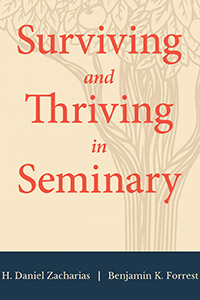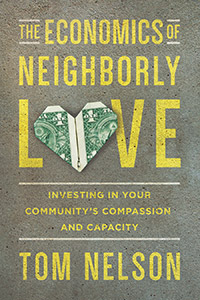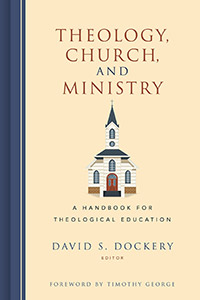 |
 |
 |
 |
Surviving and Thriving in Seminary by H. Daniel Zacharias and Benjamin K. Forrest (Lexham Press 2017)
Review by Andrew J.W. Smith
Seminary is hard. Whether you’re single or married, seminary is probably going to push you in ways you didn’t expect. Beyond simply learning time management or sharpening their research skills, prospective seminary students need an array of practical and spiritual tools in order to navigate their studies. Students also need to wrestle with their souls before they start their first class, preparing for a time of spiritual dryness as they start to experience God and his Word in a brand new and often disorienting way.
This book, written by two former seminarians who now teach at divinity schools, provides a helpful guide to the challenging and often discouraging world of seminary education.
“We want not only to help you understand the reality of what you are getting yourself into, but also to equip you with the skills to succeed — spiritually, relationally, and academically,” they write. “We’re not going to coddle you or pull any punches. We know exactly how students sabotage themselves and procrastinate because we’ve done it and seen it done. Being a seminary student is rewarding, but it is also demanding. You need to know this ahead of time so you are not blindsided.”
The Economics of Neighborly Love: Investing in Your Community’s Compassion and Capacity by Tom Nelson (IVP Press 2017)
Review by Tabitha Rayner
“Poverty is lacking relationships that bring flourishing,” Tom Nelson writes in his insightful and helpful guide to understanding what loving your neighbor means, The Economics of Neighborly Love: Investing in Your Community’s Compassion and Capacity.
When I moved to Louisville almost four years ago, I moved into the neighborhood touted as being the poorest zip code in Louisville. It was a shocking, life-altering, eye-opening experience that has entirely shaped the way that I relate to the world around me. As I read this book, I found myself wishing that everyone could read it. Nelson writes about poverty as someone with experience, wisdom, and compassion. He encourages Christians to be good workers who contribute to society with their finances and strong work ethic, arguing that this is one of the best ways to care for the poor. If you are looking to be encouraged toward a biblical work ethic and a godly view of economics and finances, read this book.
Hope of Every Promise by Kenwood Music (Kenwood Music 2017)
Review by Aaron Cline Hanbury
Longing weighs on Hope of Every Promise. And while you probably shouldn’t call this EP a concept album, you can’t miss the continuity of the project. Taken together, the six tracks anticipate an audience walking a spectrum of suffering, discouragement, and exhaustion — Christians longing for rest.
This collection of singable, churchy songs, out last month from the Louisville, Kentucky-based Kenwood Music, invites you to reflect on God’s promises, to remember his love, and to reclaim the fulfillment of each in Jesus Christ.
The opening track, “Hope for Every Promise,” acts like a summary of the EP, identifying the kind of impatience characteristic of the Christian life and celebrating the source of fulfillment and hope. The standout track, “Good to Know the Father,” offers a soul-filled, mournful recitation of God’s love. It’s a weary celebration reminiscent of the third Psalm.
Five of the six tracks on Hope of Every Promise are the work of Southern Seminary alumnus Matt Damico.
Theology, Church, and Ministry: A Handbook for Theological Education edited by David S. Dockery (B&H Academic 2017, $30.00)
Review by Caleb Shaw
In his new book, Theology, Church, and Ministry David S. Dockery, president of Trinity International University, explains theological education and its relationship to the church. Dockery has gathered some of the brightest minds in evangelicalism to write about their own areas of expertise within theological education. Dockery and other contributors, such as Southern professor Gregory A. Wills, explain theological education and its history, survey the many areas of the theological education curriculum, and show the relationship between education and ministry in the church.
“Wherever the Christian faith has been found,” Dockery writes, “there has been close association with the written Word of God, with books, education, and learning.” Institutions like Southern and others advance the faith and join in this great tradition of Christian thinking by participating in theological education.
Dockery summarizes the purpose of theological education well by writing, “Theology and healthy theological education provide the backbone for the church. The work of theological education, done well, helps develop mature believers, strengthening heart, head, and hands, and resulting in the praise and exaltation of God.”
Theology, Church, and Ministry is a helpful introduction to what theological education is and why pastors should pursue it. If you have lost sight of the purpose of your long hours of reading, writing, and studying at seminary, I would encourage you to let this book remind you of the important task of theological education with which you are involved– a task that Christ uses to build up his church.




